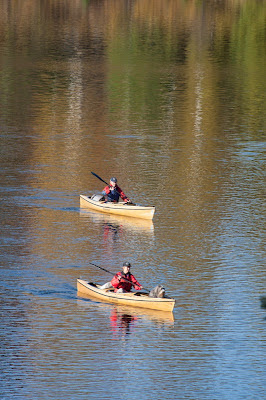BLOG 27. Best Wood-burning Trail Stove on the Planet!
by Cliff Jacobson
www.cliff-jacobson.com
 |
| Littlbug Senior stove: BWCA (yes, it's legal when placed next to the fire grate) |
One of the perks of being a writer is that I get to try new products. I’ve spent enough time in the woods that I can often assess field performance without exhaustive testing. To some, this may sound egotistical, but those who’ve spent serious time in the bush pretty well know what works and what doesn’t. For example, small zippers are the first to fail on a garment; plastic knobs on cookware and stoves break or burn; tents that don’t have enough stake points blow down in high winds, etc.
Thus, I was not impressed when I received a Littlbug® (www.littlbug.com) wood-burning stove for review. It was simple (too simple)—just four stainless-steel parts that snap together. I viewed it as nothing more than a “take-apart” charcoal burner. I set the stove aside with the intent of testing it later. Much later.
 |
| Stainless steel parts snap together in seconds! |
Ultimately, I got a call from the manufacturer asking if I had tried his stove. I made up some excuse, promising I’d get to it soon. I didn’t. A week later, another call and another excuse. This pattern continued for a month, after which, I’d had enough, so I reluctantly went outside and fired up the stove.
 |
| Parts snap together easily and nest for travel |
Minutes later, I was hooked. The stove burned hot and clean, with very little fuel. I heaped on more wood and watched the base turn cherry red. I filled my tea kettle with water and set it on the pot supports—eight cups of water came to a rolling boil in just under seven minutes. Impressive! Unlike other small wood-burning trail stoves, the Littlbug will accept big wood. Logs up to about three inches in diameter---and as long as you like—can be loaded through the top slots—just stack ‘em in like inverted tipi poles. The Littlbug doubles as a campfire, but it uses far less wood. Want a bonfire? Build a pole tipi around the stove or stack wood “log-cabin” style on top of the burner and you’ll feel the heat a dozen yards away.
 |
| Littlbug burns hot with very little fuel |
The stainless steel parts consume almost no space in a pack. No other wood-burning trail stove is as compact.
My friends and I have come to love the Littlbug stove. When used with a deep-sided steel oil-drain pan or pizza pan, it qualifies as a government-approved “fire within a fire-pan” (the pan must measure 12” x 12” with a 1.5” lip). If you’ve hiked or boated out west where fire-pans are required, you’ll love the Littlbug stove. Unlike the heavy, bulky pans most boaters carry, the stove and pizza pan will fit easily into a solo canoe or kayak.
 |
| Rio Grande River, Texas: Littlbug stove and pizza pan |
Specifications:
There are two models (Littlbug Senior and Junior):
• Senior: Weight: 19 oz / Junior: 5 oz
• Senior: 9” x 8” diameter / Junior: 6” x 5.5”
• Assembly time: about 15 seconds
• Senior 1 quart water boil time: 3-5 minutes / Junior 4-6 minutes
• Vent holes in the base can be turned towards or away from wind.
• The stove can be fired with an alcohol burner like the one that comes with the popular Trangia stove.
 |
| Littlbug Senior with hanging chains and FireBowl |
Accessories (extra cost):
• Pot sling: allows the burning stove to be hung (by chains) from a limb or hook—ideal for snow camping or where a ground fire might be dangerous. Sounds unstable but it isn’t.
• FireBowl: a compact, ultralight, three piece stainless steel fire-bowl. The parts snap together to create a fire-pan that contains ash and embers. Unfortunately, the FireBowl does not meet federal government specifications for fire-pan size. But it is very effective—the feds should make an exception here. Note: there are two FireBowl sizes—Senior and Junior.
• Nylon tote bag (envelope).
Optional Use: The sides of the assembled stove (sans the two pot supports) can be used as a wind-screen for a gasoline or butane trail stove.
 |
| Cliff and Littlbug stove: BWCA |
In summary: The Littlbug stove (www.littlbug.com) provides an edge on rainy days and where wood is scarce or where a closely contained fire is essential. When canoeing above the tree line we fuel the stove with dead willow twigs—provides cheery heat and a way to burn trash. The stove burns hot with very little wood; it doubles as a cook-stove and campfire. It’s simplicity belies its effectiveness. In a word, it is “awesome”!
Cliff Jacobson
www.cliff-jacobson.com
XXX























